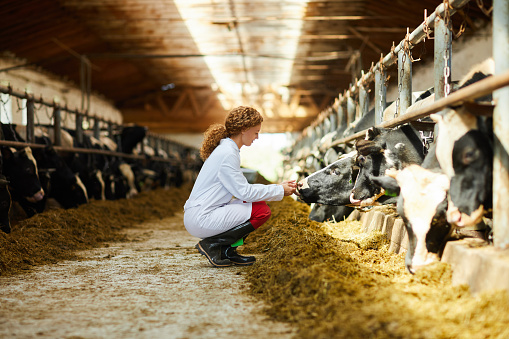INTERNATIONAL
European Union to Implement New Veterinary Medicinal Product Regulations
On January 28, 2022, a new regulation pertaining to the use of veterinary medicines took effect in the European Union (EU). The regulation was originally adopted in 2019 and has three objectives:
-
to strengthen the EU fight against antimicrobial resistance
-
to set up a modern, innovative and fit for purpose legal framework
-
to incentivize innovation for veterinary medicinal products (VMPs) and increase their availability
The regulation is a significant step toward the EU goal put forward in the Farm to Fork Strategy to reduce by 50% overall antimicrobial sales for farmed animals and in aquaculture by 2030.
Regulation (EU) 2019/6 prohibits the preventive feeding of antimicrobials in feeds, greatly restricts the use of medicated feeds, and will ban the use of antimicrobials designated as reserved for human use. In addition, the regulation aims to promote prudent and judicious use of antimicrobials in all animals and to decrease antimicrobial use on farms by increasing biosecurity and management practices to promote healthy animals without the need for antimicrobials. The regulation will require member states to collect data on the sale and use of antimicrobials. The European Medicines Agency will be required to maintain a Union product database.
The EU intends the new regulation to promote innovation of veterinary medicines by simplifying the assessment process and extending the protection of data for 18 years. New definitions and clarification around biological VMPs and novel therapy VMPs are expected to stimulate research and innovation in these areas and to increase the number of new products brought to market. Three additional acts are expected to be published in 2022, specifically addressing the format to collect member state antimicrobial sales and use data, the list of antimicrobials designated as reserved for human use, and import requirements for animals and foods of animal origin.
NATIONAL
US Veterinary Wellbeing Study 2021
On January 18, 2020, Merck Animal Health, in collaboration with the American Veterinary Medical Association (AVMA), released the results of a study on the wellbeing and mental health of veterinarians and veterinary staff in the US. This was the third study Merck has conducted on veterinary wellbeing since 2017, the first since the COVID-19 pandemic began in 2020. In September and October of 2021, just under 2,500 veterinarians across the US completed the online survey. Veterinary technicians and other support staff were included for the first time in 2021, with 448 completing the questionnaire.
Eighty-eight (88%) of responding veterinarians indicated both student debt and concerns about the risk of suicide as leading stressors. In addition, 9.7% of veterinarians reported serious psychological distress, up from 6.4% in the previous 2019 wellbeing study. The mean student loan debt for veterinarians graduating in 2020, including students without loans, was $157,146. The same year, the AVMA reported the mean starting full-time salary for new graduates was $90,722. Black or African American graduates were found to graduate with more debt than their classmates.
Challenges related to finding qualified staffing and providing veterinary services in the ever-changing pandemic landscape were also reported by the majority of respondents. Veterinary support staff and veterinarians reported understaffing due to COVID-19 exposures, isolation, or caring for family members. Only one third of participants indicating “distress” in the survey practice healthy stress management methods. Merk provided a $100,000 grant to AVMA in support of resource development to promote mental health across the veterinary profession.
LOCAL
Bush Meat Seized at MSP Airport
A recent increase in attempts to smuggle bushmeat into the United States via the Minneapolis-St. Paul (MSP) Airport has been noted by US Customs and Border Control (CBC). Since late December 2021, CBC has noticed a rise in passengers declaring “fish” on customs paperwork, while determining the actual item is bush meat, at times intermingled with fish. Bush meat is defined by the US Center for Disease Control and Prevention as “raw or minimally processed meat that comes from wild animals in certain regions of the world including Africa”. CBC officials seized over 100 lbs of bush meat at MSP in the final week of December
Wild animals commonly used for bush meat are nonhuman primates, rodents, and bats. Bush meat is typically smoked, salted or dried. These processes are not sufficient to kill certain pathogens, posing a communicable disease risk to those who eat or come in contact with the product. Ebola has been linked to bush meat consumption, while exposure to other zoonotic pathogens, such as HIV and monkeypox, have been linked to butchering and cooking the wild animals.
The Minnesota Department of Agriculture issued a press release on January 14th, reminding the public that it is illegal to possess and consume bush meat. Any bush meat found will be destroyed, as well as any personal items determined to have come in contact with the meat. A person found to be in possession of bush meat, in any amount, will be fined $250,000. Members of the public are encouraged to report the sale or smuggling of bush meat by calling the US Animal and Plant Health Inspection Service Anti-Smuggling Hotline at (301) 734-8534.
European Commission News Release
EU Veterinary Medicines and Medicated Feed Questions and Answers
EU Regulation on Veterinary Medicines Products
Merck Animal Health
American Veterinary Medical Association News
AVMA Resources for Veterinarians
Minnesota Department of Agriculture
CBS Minnesota
|
